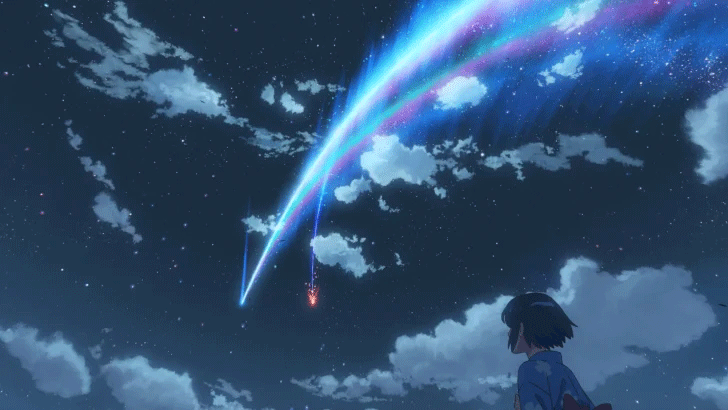
Credits: ©2016 TOHO CO., LTD. / CoMix Wave Films Inc. / KADOKAWA CORPORATION / East Japan MarketingCommunications,Inc. / AMUSE INC. / voque ting co.,ltd. / Lawson HMV Entertainment, Inc.
Your Name by Shinkai Makoto with Introductory Talk by Dr Rayna Denison
- 19 March 2023
- Talk: 15:00-15:30, Film: 15:30-17:15
- The Hall, Japan House London, 101-111 Kensington High Street, London, W8 5SA
- https://www.japanhouselondon.uk/whats-on/2023/your-name-by-shinkai-makoto-with-introductory-talk-by-dr-rayna-denison/
- +44 (0)20 7932 7100
- info@japanhouselondon.uk
- Tweet
In conjunction with the exhibition Kumihimo: Japanese Silk Braiding by Domyo, Japan House London is delighted to present a free screening of Your Name, a 2016 animation by Shinkai Makoto enthusiastically received, in Japan as well as abroad, by both critics and fans alike. Viewers will be rewarded with a storyline illustrated with metaphors related to kumihimo.
In his 2016 animated romance Shinkai Makoto again masterly explores the themes of separation, longing and reconciliation that he has become known for from his previous works - 5 Centimetres Per Second (2007) and The Garden of Words (2013). Once more he leaves the audience in awe by the meticulously detailed, hyper-realistic scenery, including the iconic Suga Shrine staircase in Shinjuku, which became a must-see spot on the sightseeing route for devoted anime fans.
However, the mesmerising urban settings of modern-day Tokyo are not the only locations into which Shinkai’s animation provides a glimpse. Mitsuha’s hometown in densely forested rural Japan with its Shintō rituals and old traditions is equally beautifully portrayed.
As the bond between the protagonists tightens and the impact they have on each other’s life grows bigger, the comet passing ominously close to the Earth imposes a threat on the universe they live in...
The screening is preceded by an introductory talk by Dr Rayna Denison, Professor of Film and Digital Arts at the University of Bristol.
In her talk Dr Denison explains how Shinkai Makoto’s work finds inventive ways to link together its multiply distanced teen protagonists, Tokyo high school student, Taki, and Mitsuha, who lives in Itomori, in Gifu Prefecture. On a fantastic level, Taki and Mitsuha literally come to know one another as they body-swap, experiencing each other’s lives. On a more mundane level, they become entwined through the messages they send to one another. These messages cross between media, encompassing all the formats teens can access, from phones and social media to their passing of paper notes. These become braided by Shinkai into a tapestry of communication that is funny and touching by turns. On a more spiritual level, too, Shinkai uses images and metaphors inspired by kumihimo – braided threads – to connect and unite his characters. From red threads used to romantically connect the souls of lovers, to the naming of Mistuha’s town as Itomori-machi literally ‘the town of protective threads’, Shinkai uses metaphors of braiding and blending threads to entangle his hero and heroine in one another’s stories.
The talk, from 15:00-15:30, will be livestreamed on Japan House London’s Facebook, LinkedIn, YouTube and Twitter profiles.
No registration is required to watch the talk online.
The screening is in Japanese with English subtitles.
Duration of film: 107 mins
Guests who are booked to attend the screening can also enjoy 10% off drinks at The Stand on their way in.
About the Speaker
Dr Rayna Denison is Professor of Film and Digital Arts at the University of Bristol, where she is also Head of Department for Film and Television. After reading Japanese Studies at the University of Oxford, Rayna received MA and PhD degrees in Film Studies from the University of Nottingham. Her scholarly work includes the books Anime: A Critical Introduction (Bloomsbury Academic, 2015) and the forthcoming Studio Ghibli: An Industrial History (Palgrave, 2023). She has also edited the academic collection Princess Mononoke: Understanding Studio Ghibli's Monster Princess (Bloomsbury Academic, 2018) and has edited special issues of academic journals including the ‘Journal of Japanese and Korean Cinema’ and ‘Japan Forum’. She has written articles on anime that can be found in ‘Cinema Journal’, ‘Velvet Light Trap’ and ‘Animation: An Interdisciplinary Journal’ among others. In addition, Dr Denison has also written articles about anime for ‘The Conversation’, literary journal ‘Wasafiri’ and recently wrote a contextualising history for the brochure of the Royal Shakespeare Company's adaptation of My Neighbour Totoro at the Barbican.
Booking Essential
*Age rating: please note that this movie is rated 12A and is therefore not suitable for children aged under 12.
